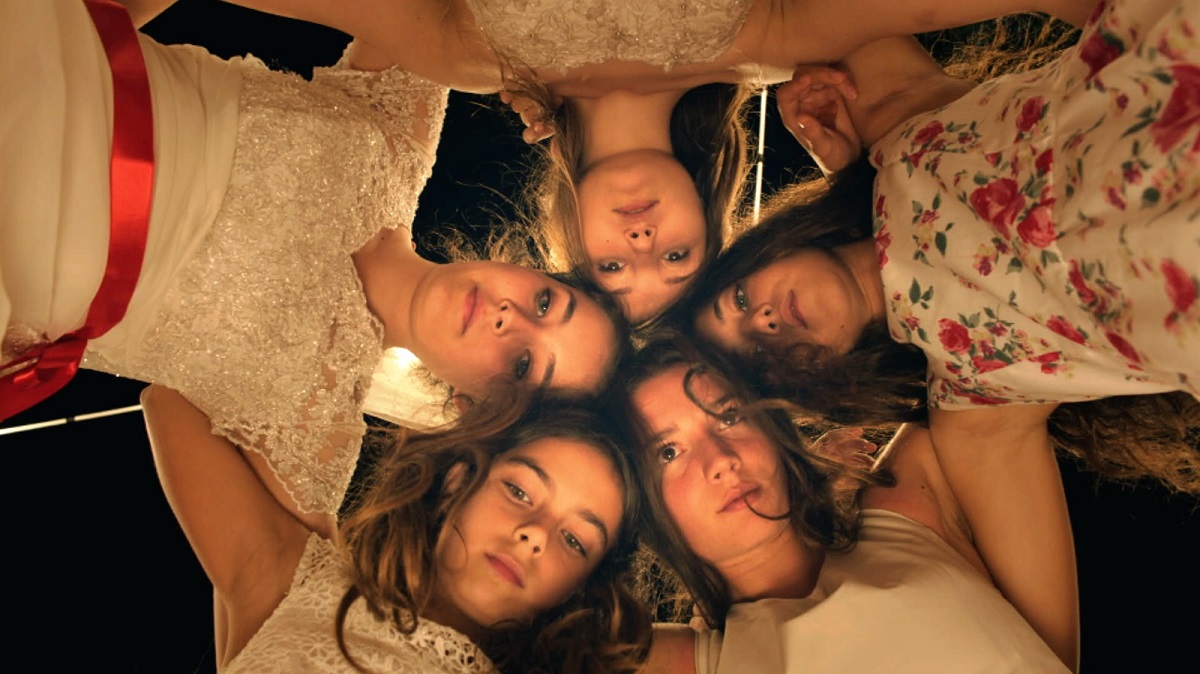Wild Mustangs: Turkey’s Five Sisters

Pictured: Clockwise starting with actress in red sash: Tugba Sunguroglu, Ilayda Akdogan, Doga Zeynep Doguslu, Elit Iscan and Gunes Sensoy in “Mustang.” Photo courtesy of Cohen Media Group.
It’s not unusual these days to hop on a plane in Los Angeles after morning coffee and be in Turkey in time for a tasty shish kebab dinner. It’s all part of living in the Western world, right? But the five sisters in Mustang, director Deniz Gamze Ergüven’s award-winning feature film, don’t live in cosmopolitan Istanbul. Sequestered instead in a small village 600 kilometers away, they may as well be five wild horses, longing to shake their wild manes in the open air.
Picture this: Early summer. Five teenage sisters still garbed in their school uniforms splash about on a nearby beach with a few male classmates in tow. It’s innocent enough, until a village matron tattles to the grandmother about their so-called illicit behavior. Cell phones and computers — “instruments of corruption” — are taken away. The girls are forbidden to leave the house. Overnight, they have become prisoners — held to a regimen of household chores and baking in preparation for marriage contracts at the earliest possible moment. One by one the eldest members of the group are sacrificed against their will — the ensuing pain and anguish resulting in tragic consequences. It is only the youngest, Lale (played with just the right measure of sullenness, sweetness and childish abandon by Gunes Sensoy), who surprises with her irrepressible will to survive.
What keeps the story from collapsing into domestic melodrama is the free-wheeling force of the five young actresses. The pacing is first-rate. The ensemble’s combustible energy, pulling at every opportunity to loosen their reins, keeps the audience not only focused but wanting to cheer them on. As Ergüven explains in the press notes, “I see the five girls as a kind of five-headed monster that loses a part of itself every time one of the girls is absent from the story.”
Elit İşcan in the role of Ece was required to do a love scene as one of the older sisters of the group and was the only one with prior acting experience. Nevertheless, hundreds of girls were interviewed for the roles until the right connections were made. It paid off handsomely as they work as seamless stable mates (forgive the pun). Ergüven and Alice Winocour as co-writers have also imbued the script with memorable examples of arranged couplings (the importance of bloodletting on the wedding night sheets being only one of them). Any rational minded man or woman would be expected to gallop hastily in the other direction when contemplating such courtship.
Whenever returning to her birth country, the French-educated director still feels a form of constriction. “Everything that has anything to do with femininity is constantly reduced to sexuality,” she admitted in a recent press interview. She cites stories of school principals who ban boys and girls from using the same staircases to their classrooms. Such a reduction of women to little more than baby-making machines is an amazing paradox, considering Turkey was one of the first countries to give women the vote.
It’s a simple enough story — the longing for freedom in the hearts of young, free-spirited girls everywhere. And in 2015, it’s easy to overlook just how repressive and how suffocating life can be for the female sex, particularly in a country with one foot squarely planted in the modern world and the other in the hothouse atmosphere of the middle-ages. It’s easy to understand why Mustang was the official selection of the Directors’ Fortnight at the Cannes Film Festival, going on to garner many other impressive festival awards as well as a Golden Globes and Oscar nomination in the foreign film category. Freedom never goes out of style.
Rating: B+
Video courtesy of Cohen Media Group.
Video courtesy of Film Society of Lincoln Center.
“Mustang” is rated PG-13 and runs for 94 minutes. For more information about the film (including current showtimes and locations), you can visit cohenmedia.net.










